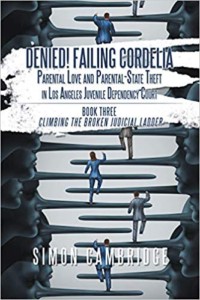Title: Denied! Failing Cordelia: Parental Love and Parental-state Theft In Los Angeles Juvenile Dependency Court. Book Three: Climbing the Broken Judicial Ladder
Author: Simon Cambridge
Publisher: Xlibris
ISBN: 978-1796037067
Pages: 1058
Genre: Non-Fiction/Memoir
Synopsis
Climbing the Broken Judicial Ladder continues the author’s journey of exploring the heartbreak and loss of first adopting Cordelia with severe reactive attachment disorder (RAD) in Washington state and then of nearly losing her to the draconian and confused child welfare legal complex in Los Angeles. In this third volume of his Denied! Failing Cordelia trilogy, Cambridge climbs the broken California judicial ladder from the California Court of Appeals (Second Appellate District) based in Los Angeles to the California Supreme Court. Cambridge concludes that in appeals relating to dependency cases, the ladder is broken for parents seeking to advocate for themselves and for the true best interests of their children. Policies relating to child welfare are flawed, Cambridge argues, because of the preemptive and prejudicial response to the issues raised during the detention of children. As with his two earlier books, Cambridge explores issues connected with how best to parent his adopted daughter and advocate for her needs in the context of a dependency case. Cordelia’s reactive attachment disorder would surface throughout the judicial struggle as would the author’s own struggles with Asperger syndrome. Each would feed negatively into the overall trauma and drama of the author’s unrelenting quest to reunite his “forever family.” Cambridge believes that dependency proceedings are ill-equipped on many levels to elicit a proper understanding of RAD or of the therapeutic parenting needed to address it. Cambridge believes that adoptive parents of children with special needs need to be understood by more sympathetic social workers and by therapists trained in attachment disorders. Cambridge’s persistent efforts to reunite his “forever family” would leave him increasingly isolated as he climbs the judicial ladder. Based on his experiences, Cambridge explores areas for reform in Los Angeles dependency proceedings and evokes Shakespeare’s King Lear by arguing that social workers need to “see better” and that the Los Angeles Juvenile Dependency Court needs to encourage a broader understanding of the issues raised through more effective legal advocacy from assigned dependency lawyers. Cambridge argues that parents should be allowed to address the court directly. Cambridge also relates how he and his daughter have found many positive and healthy ways to heal in the years since their dependency case ended. Much trauma could have been avoided if those around them had “seen better” and had recognized the value in their dramatic and loving adoption journey.
About the Author
I am originally from England but moved to Los Angeles in 1997 and then subsequently to the beautiful Emerald City of Seattle in the Pacific Northwest – an area I have now made home and developed roots in.
The Cankered Rose and Esther’s Revenge is the first of three books covering the decision of my wife, Esther, and I to adopt Cordelia, a severely traumatized girl from the Washington State foster-care system. Cordelia arrived with reactive attachment disorder trauma and a host of other “special needs” that sadly prevented any form of secure or lasting attachment to either my wife or myself. Esther proved unwilling to help me to break the cycle of acceptance and rejection and so my wife and I separated in 2008 with Esther moving back to Los Angeles.
My first book covers the dramatic circumstances of my daughter’s removal to be with her adoptive mother in Los Angeles. My second and third books will then cover the unresponsive nature of the child-welfare legal complex in the City of Angels and my intense legal struggle to reunify with my daughter after a dependency case was initiated to try to break the parent-child bond. We shall be looking at the prejudicial nature of child welfare and how the entire system is callous to motivated parents and unresponsive to the real needs of children who find themselves in foster homes or residential treatment facilities. My own struggles with Asperger’s syndrome and its quest for the truth will be contrasted with my daughter’s quest to be right.
I find writing to be therapeutic and engaging and my wish as a writer has been to produce a series of books on adopting an older child with special needs that are, and which will continue to be, part memoir and part instructional in nature, connecting both the prosaic and the passionate. As matters unfolded with respect to my adoption and near total loss of Cordelia readers will see the balance between the two guides ever shift and become effective and ineffective.
When I am not writing and worrying about my daughter, I can be found in my therapist’s office, taking in wonderful productions of the Seattle Shakespeare Company, or watching my beloved Seattle Sounders FC at CenturyLink Field in Seattle.


